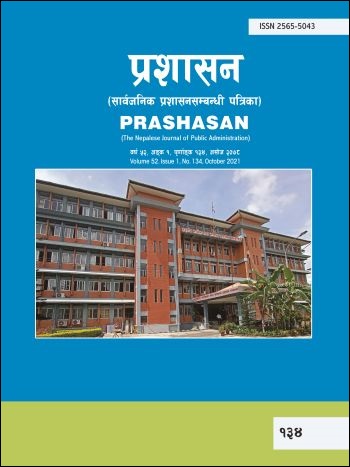नेपालको विकास प्रक्रियामा नतिजामूलक कार्यसम्पादन व्यवस्थापन {Effective performance management in Nepal's development process}
DOI:
https://doi.org/10.3126/prashasan.v52i1.44650Keywords:
सूचक, लजिकल मोडेल, नमुना, जवाफदेहिता, सुपरिवेक्षकAbstract
नेपालले करिब दुई दशक अघिदेखि समग्र विकास प्रक्रियालाई नतिजामूलक बनाउन प्रारम्भ गरेको हो। यसका लागि विकास योजना, बजेट र अनुगमन तथा मूल्याङ्कमन प्रणालीमा नतिजामूलक व्यवस्थापनका विशेषतालाई आन्तरिकीकरण गरिएको छ । यस अवधिमा लजिकल मोडललगायत नतिजासम्बन्धी विभिन्न विधि तथा औजारहरूको प्रयोग गरिएको छ । विकास प्रक्रियामा नतिजा सूचक तथा तथ्य तथ्याङ्कवको प्रयोग विस्तार भएको छ । नतिजाप्रतिको जवाफदेहिता सुनिश्चित गर्नका लागि साङ्गसठनिक तहमा आधार पनि तयार भएको छ । तर साङ्ग ठनिक नतिजालाई व्यक्तिगत कार्यसम्पादनसँग जोड्न सकिएको छैन । त्यसैगरी थालिएका प्रयासहरूलाई अझै एकीकृत स्वरूप दिन बाँकी नै छ । नतिजाप्रतिको जवाफदेहिताको पक्ष अझै पनि कमजोर नै रहेको छ । फलस्वरूप विकासको समग्र नतिजाका प्रयासहरूको उल्लेख्य प्रभाव देखिन बाँकी नै छ । यस लेखमा नेपालको विकास प्रक्रियामा नतिजामूलक कार्यसम्पादन व्यवस्थापनको प्रयोग, यसका सकारात्मक परिणाम र कमजोरीहरूका सम्बन्धमा समीक्षा गर्दै सुधारका लागि केही सुझाव प्रस्तुत गरिएको छ ।
{Nepal has been making the overall development process result-oriented for nearly two decades. For this, the features of result management in development plan, budget and monitoring and evaluation system have been internalized. During this period various methods and tools related to results including logical models have been used. The use of outcome indicators and factual statistics has expanded in the development process. The groundwork has also been laid at the organizational level to ensure accountability for the results. But the exact results have not been linked to personal performance. Similarly, the ongoing efforts have yet to be integrated. Accountability for results is still weak. As a result, the overall impact of development efforts remains to be seen. This article reviews the use of result-oriented performance management in Nepal's development process, its positive outcomes and weaknesses, and offers some suggestions for improvement.}
Downloads
Downloads
Published
How to Cite
Issue
Section
License
- The copyright of published materials of the journal remains with Ministry of Federal Affairs and General Administration.
- The published article cannot be reproduced or copied commercially by any person or institution but it can be used non-commercially for academic, research and training purpose providing proper citation is given.




